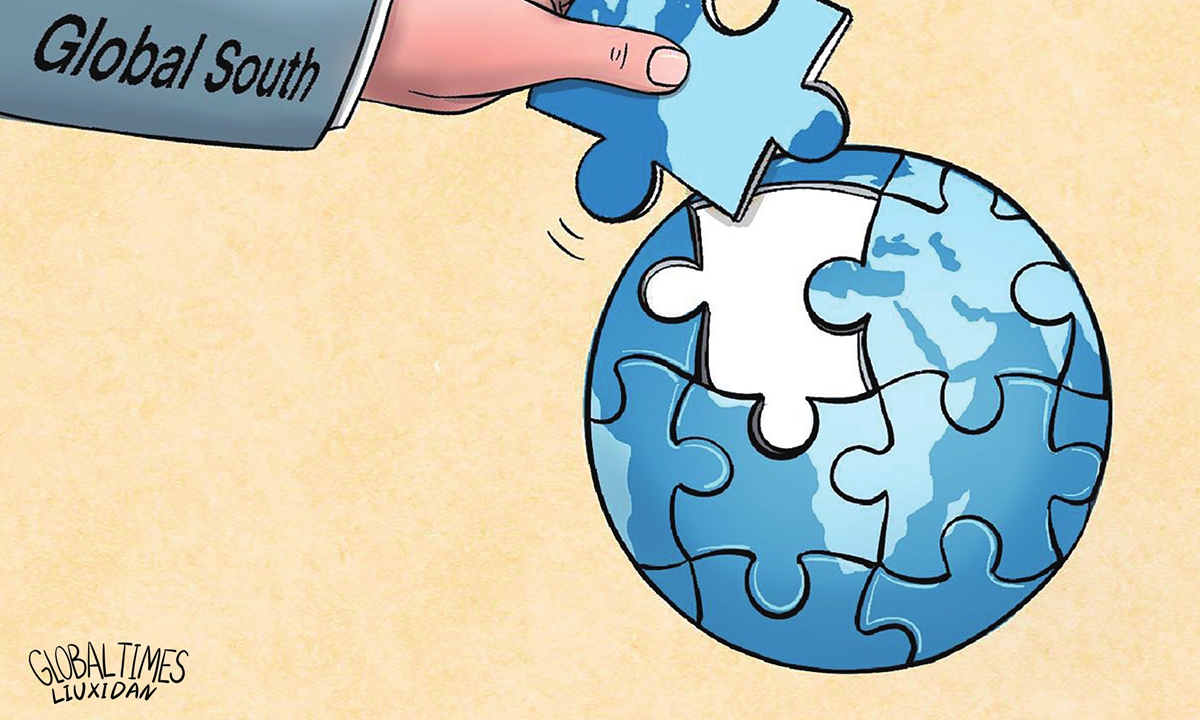
Illustration:Liu Xidan/Global Times
On Saturday,
India hosted the third Voice of Global South Summit virtually, inviting representatives from over 120 countries, with heads of state or government leaders from over 20 countries attending. The theme of the summit was "an empowered Global South for a sustainable future."
The participation of Global South countries in these discussions reflects their anxiety in the face of numerous challenges and their strong desire for their voices to be heard.
Ensuring the concerns of the Global South are taken seriously, their voices are heard and their interests are protected is the collective responsibility of all Global South countries. Achieving this goal can only be realized through a united effort.
First, Global South countries must unite and work together toward common goals. Only by uniting and speaking with one voice can Global South countries hope to gain equal footing in dialogues with the Global North and have their demands taken seriously. Indian Prime Minister Narendra Modi also called for "unity" at the summit. However, the absence of major powers of the Global South, such as China, at successive summits, has objectively undermined the unity of Global South countries.
Second, strengthening South-South cooperation and promoting North-South dialogue is essential. To achieve the goals of the Global South, it is necessary to enhance South-South cooperation, particularly among emerging countries within the Global South, such as China, India, Brazil, South Africa and Mexico. These emerging nations have the capability to provide development aid, increase investment, open markets, share technology and offer development experience to less developed Global South countries. South-South cooperation can enhance the unity of Global South nations, which in turn can facilitate dialogue with the Global North, striving for international rules that benefit Global South countries and for economic and technological assistance from the Global North.
Third, more practical mechanisms and platforms need to be established. The third Voice of the Global South Summit, hosted by India, has largely focused on raising awareness but has lacked effective action. India faces enormous development challenges. With a population living in poverty constituting a quarter of the world's poor, India doesn't have enough capacity to provide substantial assistance to other Global South countries.
At this summit, Modi announced an initial contribution of $25 million to the Social Impact Fund to accelerate the use of India's digital public infrastructure in emerging economies. When divided among the 123 participating countries, this amounts to just around $20,000 per country, which is almost negligible. Moreover, there are significant differences between countries in the Global South, requiring the establishment of specific coordination and cooperation mechanisms for different regions.
Finally, the emerging powers of the Global South should strengthen their collective leadership. The Global South encompasses a significant number of countries worldwide. Coordinating such a diverse group requires strong leadership from within. China has consistently expressed its willingness to strengthen cooperation with India and other countries on issues concerning the Global South. China and India share many areas of cooperation, such as global climate governance, where their positions and policy proposals coincide. If India sees emerging powers like China as an obstacle as it seeks to boost its international influence, and therefore excludes them from participation, it could undermine the solidarity of the Global South. This is a scenario other Global South countries would likely want to avoid.
The BRICS currently comprises the major emerging developing countries, and many countries from the Global South are keen to join. Therefore, it represents the most fitting mechanism for advancing the interests of the Global South.
The author is a professor of the School of International Relations, Sichuan International Studies University and president of Chengdu Institute of World Affairs. [email protected]乌白马角网原创文章,未经授权禁止转载。详情见转载须知。

文章点评: